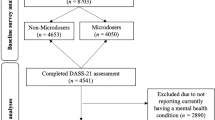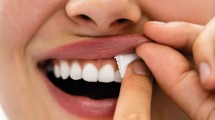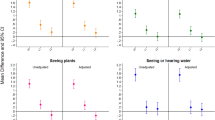Abstract
Introduction Studies outside Wales have consistently reported reduced quality of life as measured by the Early Childhood Oral Health Impact Scale. With relatively high levels of tooth decay in Wales as found through the regular dental surveys, it is important to understand different oral health-related behaviours and impact so that findings can inform oral health promotion in Wales.
Methods An oral health questionnaire was made available to volunteers registered with Health Wise Wales. Parents of children (2-6 years old) participated in the study. Frequency analyses were carried out to understand the oral health-related behaviours and regression analysis was carried out to understand the predictors of reported oral health impacts.
Results Overall reported oral health impact was low in this study. In total, 20% of parents reported that their child brushed their teeth less than twice a day and 23% reported toothbrushing without adult supervision. Drinking plain water twice a day or more was associated with good oral health in children.
Conclusion Overall, reported oral health impact was low, which is likely to be due to under-representation of study participants from the deprived areas in Wales. There is plenty of room for improvement in oral health-related behaviours.
Key points
-
Health Wise Wales (HWW), an online register of people in Wales who have volunteered to participate in research, provided access to a 'research ready' population for this study. The disadvantage of the HWW was that the register was not fully representative of the Welsh general population.
-
This paper provides an overview of oral health behaviours and reported impact on young children in Wales. Overall reported impact was low and 20% parents reported that their children brush their teeth less than twice a day.
-
Drinking plain water twice a day or more compared to drinking no water was a significant predictor of low oral health impact. Increased use of plain water by children to meet their hydration need may also indirectly help oral health.
This is a preview of subscription content, access via your institution
Access options
Subscribe to this journal
Receive 24 print issues and online access
$259.00 per year
only $10.79 per issue
Buy this article
- Purchase on Springer Link
- Instant access to full article PDF
Prices may be subject to local taxes which are calculated during checkout
Similar content being viewed by others
References
GBD 2017 Disease and Injury Incidence and Prevalence Collaborators. Global, regional, and national incidence, prevalence, and years lived with disability for 354 diseases and injuries for 195 countries and territories, 1990-2017: a systematic analysis for the Global Burden of Disease Study 2017. Lancet 2018; 392: 1789-1858.
Peres M A, Macpherson L M, Weyant R J et al. Oral diseases: a global public health challenge. Lancet 2019; 394: 249-260.
Glick M, Williams D M, Kleinman D V, Vujicic M, Watt R G, Weyant R J. A new definition for oral health developed by the FDI World Dental Federation opens the door to a universal definition of oral health. J Am Dent Assoc 2016; 147: 915-917.
Cardiff University. Picture of Oral Health 2017, Dental Caries in 5 Year Olds (2015/16). 2017. Available at https://www.cardiff.ac.uk/research/explore/research-units/welsh-oral-health-information-unit (accessed August 2023).
Gilchrist F, Marshman Z, Deery C, Rodd H D. The impact of dental caries on children and young people: what they have to say? Int J Paediatr Dent 2015; 25: 327-338.
Abanto J, Carvalho T S, Mendes F M, Wanderley M T, Bönecker M, Raggio D P. Impact of oral diseases and disorders on oral health-related quality of life of preschool children. Community Dent Oral Epidemiol 2011; 39: 105-114.
Welsh Government. Child General Anaesthetics in Wales. 2019. Available at https://www.gov.wales/sites/default/files/publications/2019-10/child-dental-general-anaesthetics-in-wales-2018-2019.pdf (accessed August 2023).
Pahel B T, Rozier R G, Slade G D. Parental perceptions of children's oral health: the Early Childhood Oral Health Impact Scale (ECOHIS). Health Qual Life Outcomes 2007; 5: 6.
Scarpelli A C, Oliveira B H, Tesch F C, Leão A T, Pordeus I A, Paiva S M. Psychometric properties of the Brazilian version of the Early Childhood Oral Health impact Scale (B-ECOHIS). BMC Oral Health 2011; 11: 19.
Li S, Veronneau J, Allison P J. Validation of a French language version of the Early Childhood Oral Health Impact Scale (ECOHIS). Health Qual Life Outcomes 2008; 6: 9.
Lee G H, McGrath C, Yiu C K, King N M. Translation and validation of a Chinese language version of the Early Childhood Oral Health Impact Scale (ECOHIS). Int J Paediatr Dent 2009; 19: 399-405.
Chaffee B W, Rodrigues P H, Kramer P F, Vítolo M R, Feldens C A. Oral health-related quality-of-life scores differ by socioeconomic status and caries experience. Community Dent Oral Epidemiol 2017; 45: 216-224.
Kramer P F, Feldens C A, Ferreira S H, Bervian J, Rodrigues P H, Peres M A. Exploring the impact of oral diseases and disorders on quality of life of preschool children. Community Dent Oral Epidemiol 2013; 41: 327-335.
Wong H M, McGrath C P, King N M, Lo E C. Oral health-related quality of life in Hong Kong preschool children. Caries Res 2011; 45: 370-376.
Ramos-Jorge J, Alencar B M, Pordeus I A et al. Impact of dental caries on quality of life among preschool children: emphasis on the type of tooth and stages of progression. Eur J Oral Sci 2015; 123: 88-95.
Chaffee B W, Rodrigues P H, Kramer P F, Vítolo M R, Feldens C A. Oral health-related quality of life measures: variation by socioeconomic status and caries experience. Community Dent Oral Epidemiol 2017; 45: 216-224.
Hurt L, Ashfield-Watt P, Townson J et al. Cohort profile: HealthWise Wales. A research register and population health data platform with linkage to National Health Service data sets in Wales. BMJ Open 2019; DOI: 10.1136/bmjopen-2019-031705.
Li Y, Wang W. Predicting caries in permanent teeth from caries in primary teeth: an eight-year cohort study. J Dent Res 2002; 81: 561-566.
British Society of Paediatric Dentistry. A Practical guide to children's teeth. Available at https://www.bspd.co.uk/Portals/0/A%20Practical%20Guide%20to%20Childrens%20Teeth.pdf (accessed August 2021).
Chestnutt I G, Schäfer F, Jacobson A P, Stephen K W. The influence of tooth brushing frequency and post-brushing rinsing on caries experience in a caries clinical trial. Community Dent Oral Epidemiol 1998; 26: 406-411.
Trubey R J, Moore S C, Chestnutt I G. Parents' reasons for brushing or not brushing their child's teeth: a qualitative study. Int J Paediatr Dent 2014; 24: 104-112.
Vieux F, Maillot M, Constant F, Drewnowski A. Water and beverage consumption patterns among 4 to 13-year-old children in the United Kingdom. BMC Public Health 2017; 17: 479.
Author information
Authors and Affiliations
Contributions
Anup J. Karki, Ulugbek Nurmatov, Mark D. Atkinson, Aideen Naughton and Alison Kemp contributed to the study design and writing of this paper for publication. Mark Atkinson carried out the statistical analyses.
Corresponding author
Ethics declarations
The authors declare that they have no competing interests.
HWW received ethical approval from the Wales Research Ethics Committee (REC) 3 on 16 March 2015 (reference 15/WA/0076). Applications to use the HWW for oral health data collection was reviewed by a Scientific Steering Group and Patient and Public Involvement representatives to assess if the proposed project fits with the ethos of the HWW and is scientifically sound. Participants for this study consented to complete the oral health questionnaire. Separate ethical approval was not required.
The datasets for this study are not publicly available due to privacy and/or ethical restrictions in accessing data collected by Healthwise Wales. Oral health questionnaire data that support the findings of this study can be obtained through the corresponding author on a reasonable request.
Supplementary Information
Rights and permissions
About this article
Cite this article
Karki, A., Nurmatov, U., Atkinson, M. et al. An online survey of oral health behaviours and impact on young children and families in Wales. Br Dent J (2023). https://doi.org/10.1038/s41415-023-6230-x
Received:
Revised:
Accepted:
Published:
DOI: https://doi.org/10.1038/s41415-023-6230-x



